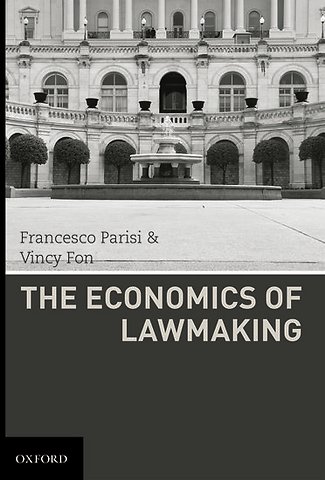The Economics of Lawmaking
Gebonden Engels 2009 1e druk 9780195374155Samenvatting
The Economics of Lawmaking explores the relative advantages and limits of alternative sources of law. Professors Francesco Parisi and Vincy Fon view the sources of law through a law and economics lens, and consider the important issue of institutional design in lawmaking. They consider the respective advantages and proper scope of application of four fundamental sources of law: legislation, judge-made law, customary law, and international law. The defining features of these four sources of law are examined using the formal methods of public choice theory: lawmaking through legislation; lawmaking through adjudication; lawmaking through practice; and lawmaking through agreement.
This book begins by examining the sources of law dependent on collective political decision-making, such as legislation. Multiple issues are considered, such as optimal specificity of law, optimal timing of legal intervention and optimal territorial scope of law, and include a thorough discussion on the sources of law derived from judges' decisions, such as common law. Parisi and Fon provide an extensive study on the roles of litigation and judicial path-dependence on judge-made law, biases in the evolution of legal remedies through litigation, and the effect of alternative doctrines of legal precedent, such as stare decisis and jurisprudence constante. They also consider the customary sources of law, with special attention on the mechanisms that determine their emergence and evolution, and explore sources of law derived from international treaties and conventions. The Economics of Lawmaking is the first systematic law and economics treatment of this field and will shed new light on the process of lawmaking.
Specificaties
Lezersrecensies
Inhoudsopgave
Introduction
PART I: Lawmaking through Legislation: Codified Law
Chapter 1. Lawmaking through Legislation: An Introduction
Chapter 2. Optimal Specificity of Laws: Rules versus Standards
Chapter 3. Optimal Timing of Legal Intervention: Lawmaking under Uncertainty
Chapter 4. Optimal Territorial Scope of Laws: Subsidiarity and Legal Harmonization
PART II: Lawmaking through Adjudication: Judge-Made Law
Chapter 5. Lawmaking through Adjudication: An Introduction
Chapter 6. Litigation and the Evolution of Legal Remedies
Chapter 7. Judicial Path-Dependence and Legal Change
Chapter 8. Theories of Legal Precedent: Stare Decisis and Jurisprudence Constante
PART III: Lawmaking through Practice: Customary Law
Chapter 9. Lawmaking through Practice: An Introduction
Chapter 10. Fostering the Emergence of Customary Law
Chapter 11. Customary Law and Articulation Theories
Chapter 12. Stability and Change in Customary Law
PART IV: Lawmaking through Agreement: Treaty Law
Chapter 13. Lawmaking through Agreement: An Introduction
Chapter 14. Formation and Accession to Treaties
Chapter 15. Ratification and Reservations: The Effects of Reciprocity
Chapter 16. The Hidden Bias of Treaty Law
Conclusions
Anderen die dit boek kochten, kochten ook
Rubrieken
- advisering
- algemeen management
- coaching en trainen
- communicatie en media
- economie
- financieel management
- inkoop en logistiek
- internet en social media
- it-management / ict
- juridisch
- leiderschap
- marketing
- mens en maatschappij
- non-profit
- ondernemen
- organisatiekunde
- personal finance
- personeelsmanagement
- persoonlijke effectiviteit
- projectmanagement
- psychologie
- reclame en verkoop
- strategisch management
- verandermanagement
- werk en loopbaan







